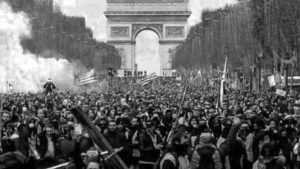
By Nathalie Clarke
Paris, France—Since May, French workers from all industries and students of all ages have been rising up against continued austerity. Austerity means cuts to wages and social programs making people poorer. Emmanuel Macron, the bankers’ president, as he’s often called because of his work with super rich bankers and his pro-rich, anti-worker policies, has been doing everything to turn back any small victories workers have won through class struggle.
After privatizing the French railway company, which puts workers at risk of mass layoffs, reducing government investment in public hospitals, and attempting to reform schools to side-line working-class students, he’s recently decided to increase the price of diesel fuel.
In response, over 280,000 workers from various parts of France headed to Paris and other big cities, created makeshift barricades from trashcans and old chairs, and reminded the ruling class how powerful a mass movement of workers can really be. Beyond the big cities, thousands of actions happened all over the country, in small towns, on the sides of roads, at tolls, at roundabouts.
This movement, called the “yellow vests” for the high-visibility jackets they wear, began without a political party or union, amongst workers complaining on social media—now driven to the streets by their fury.
The “yellow vests” movement, so-called for the high-visibility jackets the protesters wear, started without the leadership of a political party or union; the movement began among workers whose protests on social media spilled into the streets.
The movement has not only galvanized thousands of workers, it has widespread support: 80% of French citizens declared they support the yellow vests.
The movement erupted in response to a few cents increase on the price of diesel fuel, but it has come to encompass all workers’ frustrations at the elite government’s disconnection with most of France. Most recent demands include a capped monthly salary of 15,000 Euros (around 10 times minimum wage in France), a tax on airplane and boat fuel (which would affect large corporations and not workers), and an end to French interventions in Syria. The class struggle has allowed people who felt divided because of their race, their political party, the industry they work in, their religion, or their sexual orientation to realize that they have far more in common with each other than with the ultra-rich capitalists.
The yellow-vests have fueled a widespread feeling amongst workers: anger at inequalities stemming from the government’s imposing anti-worker and poor rightwing policies. But because elite politicians like Macron and his cabinet are not amongst those who benefit from welfare, unemployment benefits, or housing aid, they see no problem in reducing spending that literally saves lives. Macron’s Trump-like government claims that the increase in the price of diesel is an ecological tax, acting as though they are not aware that taxes on diesel will disproportionately affect rural areas, where people drive to work every day and where most live below the poverty line. Any tax (that does not depend on income), whether the proposed diesel tax or the absurdly high sales tax in Louisiana, is unjust because people who make 7 dollars an hour pay the same as those who earn over 250 dollars an hour.
The big business media, if it speaks of the yellow-vests at all, will probably talk about the rioting that occurred in several big cities. It was not rioting; it was a justified rebellion. They, of course, make no mention of the billionaires who steal MILLIONS of Euros from France every year by cheating on their taxes. No one will mention that these workers are engaging in the greatest act of self-defense there is: fighting for their right to exist. Poverty is deadly: an estimated 10,000 to 14,000 people die per year because of unemployment in France and 6,000 people die because of homelessness.
A few cents may seem like nothing to elites who have never lived on minimum wage, but we workers know how much a few cents can mean when the paycheck won’t come for another week, rent is due tomorrow, electricity and gas bills were due yesterday, there is no food in the fridge, and the kids need coats for the cold weather. Whether in New Orleans, Louisiana or Orléans, France, workers generate all the wealth of society. Our children don’t deserve to go hungry. We deserve better than to struggle every month to make ends meet. We deserve more than the crumbs the capitalist offers us. We deserve better because it is from the sweat of our labor that the capitalists make their profits, because we are the unsung heroes—carpenters, electricians, culture-bearers, hospitality workers, nurses, teachers, builders, truckers, train drivers—upon whose labor society is built. The capitalists, whether in France or the United States, will not give us what we deserve, but, united as a class, we can take it.
